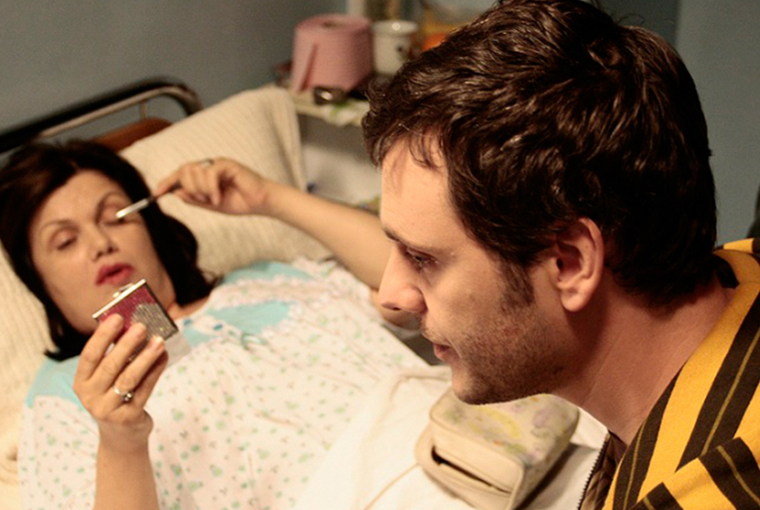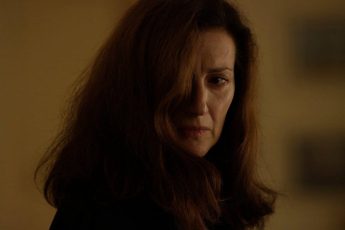Black and White and Shades of Grey
Adrian Sitaru’s Best Intentions (Din dragoste cu cele mai bune intentii, 2011)
Vol. 10 (October 2011) by Moritz Pfeifer
The hospital has certainly found its place as Romanian film’s preferred cinematic stage. From Pintilie’s The Oak to Puiu’s The Death of Mr. Lazarescu – even in 4 Months, 3 Weeks, 2 Days in a broader sense – the clinical setting provides a microcosmic glimpse of society’s misfits. In all of the aforementioned films, the hospital (and in the last example, the absence of one) becomes the battleground for deep sociopolitical conflict.
Adrian Sitaru’s Best Intentions lives up to this tradition as most of his film also takes place in a hospital. Alex a young man (Bogdan Dumitrache) living in Bucharest receives a phone call from his father, who tells him that his mother had a stroke. He immediately leaves, as though it would be up to him to save her life. Indeed, Alex is a sort of skeptic control-freak, hyper-anxious when things work out in an unexpected way. He wants to send his mother to different doctors and get multiple diagnosis, even though his mother didn’t even have a stroke, as it turns out. And while she is already merrily receiving her friends, he still tries to organize medication, conspiring against the doctors whose sage and careful attitude lets them appear more like incarnations of Hippocrates than like the apathetic amateurs Alex is obviously seeing in them. Alex believes that cure can only come from his hands.
The young director thus turns the tradition upside down. For those familiar with Romanian health care as it is depicted in Puiu’s Lazarescu, Alex’s behavior would not only seem comprehensible but would basically be his duty. In Lazarescu, the horribly sick main character is refused treatment by indifferent wisecracks who sent him from clinic to clinic, until death. In Best Intentions, the only one who tries to cure the patient by passing her on is the patient’s son, the irony being that he is not indifferent, but has good intentions for this useless expense of energy and emotion. So what is Sitaru trying to tell us? That Romania is not THAT bad? That the real malaise is people’s skeptic perspective on things, their prejudice and badmouthing and that it is impossible to do a good job when there’s always someone accusing you of doing everything wrong?
Here, Sitaru is definitely in opposition with the gloomy, observant, black-humored visions of his contemporaries whose films (Lazarescu, Police, Adjective, 4 Months) succeed in portraying anti-heroes confronted with a severely dysfunctional system – be it health care, justice, or family. In Sitaru’s film, it is, however, the hero who is wrong, and the system is not only functional but also overly humane. Even though an interesting reversal of the artistic trend, Sitaru’s conflict is basically established after the first twenty or so minutes of the film. The redundant attempts of Alex to grab our attention by looking in the camera seems like just another variation of his neurotic tick – he even wants to control the audience.
However, this is not the only artistic flaw in Sitaru’s film. His black-and-white conception of the world, of the phantasmic individual totally at odds with the neat reality, is just too clear-cut to appear convincing. The finesse of Puiu’s Lazarescu, Porumboiu’s Police, Adjective, and Mungiu’s 4 Months is that the anti-heroes in these films are inseparable from the system that makes their lives impossible. They are not heroic victims of some exterior coup. They are powerless against institutional fantasies of justice or health because they themselves live in a fantasy that makes a different reality impossible. One cannot victimize Dante Lăzărescu, for example, who is clearly the cause of his own sickness. The girls in 4 Months are obvious victims of a sadistic system, but this doesn’t justify their own atrocities (trashing an aborted fetus, for example). By separating the heroes fantasy from the system, is Sitaru not suggesting ideals much more deceiving – because fairy-tale like – than those of the pessimistic vision his movie tries to overcome?
One might wonder if Sitaru really thinks of his fellow filmmakers as he thinks about his character Alex. If so, then he clearly misunderstood them. Of course, things can appear more miserable as they are, and to neurotically look for delusions where there can be nothing found, is surely a delusion in itself. But what lacks in Sitaru’s film, is precisely the realistic element that was present in the “delusions” portrayed by his contemporaries: that everybody was in some way involved in them.
That things are never black and white but more like shades of grey is a witticism. If shades of grey – grey streets, grey sky, grey faces –, make up the distinct color palette of filmmakers like Porumboiu or Puiu, it is no surprise that the sun rays permeating the hospital in Sitaru’s film are blinding the characters more than they are giving light.




Leave a Comment